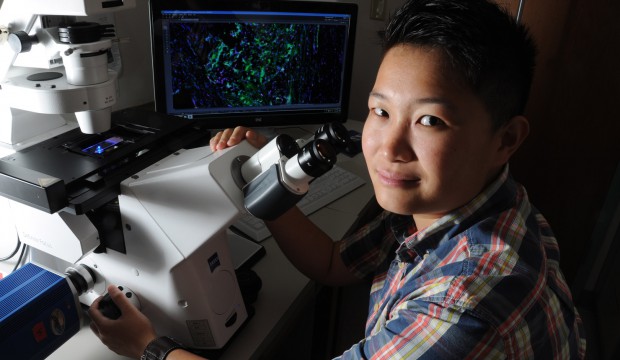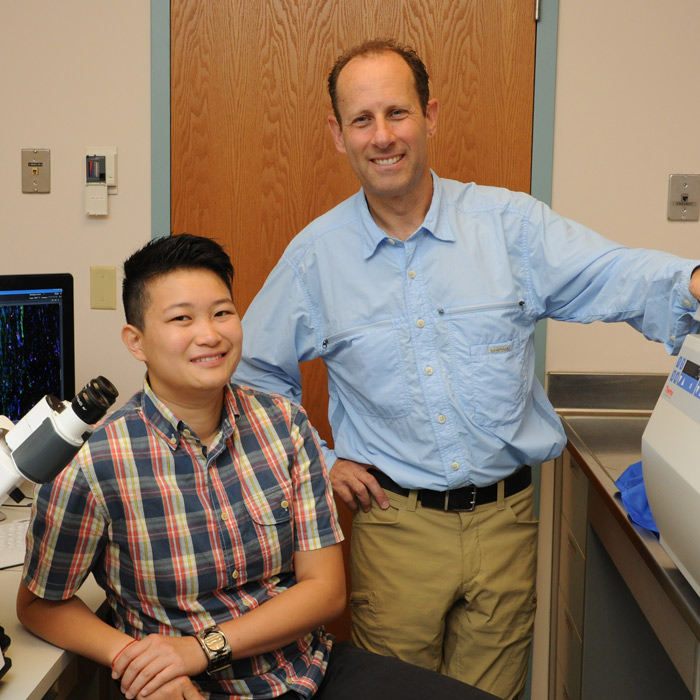
Herpes simplex virus type-1 (HSV1) is highly contagious and common worldwide. While a majority of the population has the virus—its most common manifestation is cold sores—most don’t have symptoms. But the virus can also lead to disease with severe complications, such as encephalitis (inflammation of the brain) and keratitis (inflammation of the eye’s cornea).
“Herpetic stromal keratitis is the leading cause of infectious blindness in the US,” says Yike Jiang, an MD-PhD candidate at Geisel School of Medicine. “And what’s interesting about this ocular form of HSV1 is that it’s not entirely due to the virus, but to the body’s immune response.”
Under David Leib’s tutelage, Jiang is investigating immune pathways that may lead to mitigating damage to the eye and stopping the body’s response to the virus in its tracks. Her work has yielded striking results and earlier this summer she received the Priscilla Schaffer Award for Outstanding Graduate Student Presentation during the 40th annual International Herpesvirus Workshop, which brings together more than 600 investigators from around the world. The award commemorates Dr. Schaffer’s contributions to herpes virology and her dedication to mentoring young virologists.
“For many graduate students, when they first begin conducting research, there’s a constant feeling of self-doubt—you’re always asking yourself if you are good enough, smart enough, or if what you are doing matters,” Jiang says. “Getting this award from the larger scientific community is a nice affirmation that I’ve made a contribution to the field. It confirms that I should keep doing what I’m doing.”
What Jiang is doing is looking at dendritic cells—the immune system’s antigen-presenting cells, which play an important role in immunity by acting as messengers between the innate and the adaptive systems. “Because the adaptive immune system response is critical to the development of the ocular disease, if we manipulate how dendritic cells are talking to the adaptive immune response, we can lessen the disease caused by the immune response in the eye,” she explains. As a result of this finding we may be able to use drugs to change the immune response in the eye that can still lead to protection against this virus, she says, but not lead to this immune mediated disease.

“Yike receiving the Schaffer Award is particularly meaningful to me because I trained with Priscilla Schaffer in the late 1980s while I was a postdoc at Harvard,” says David Leib, PhD, professor of microbiology and immunology at Geisel and Jiang’s mentor. “Priscilla died in 2009, but Yike is the type of student of which Priscilla would have been proud and supportive—Priscilla was both a tough and terrific mentor with little love of sentimentality, but she was always strongly supportive of her trainees at all levels.
“Yike’s work links cell biology and immunology to a common and serious ocular infection, and truly points toward new avenues for therapy against this incurable and blinding disease,” he says. “This is exactly the type of work that Priscilla championed and she would have admired Yike’s indomitable scientific spirit and her lucid presentations—the essence of which gained her this award.”
Science is hard work—long hours are spent in the lab asking the wrong questions and making mistakes until you get it right, Jiang notes, but having a wonderful mentor makes a big difference, especially someone who encourages you to do your own work. “David has a good sense of humor and is easy-going,” she says. “He gives me the independence and creativity I need, but he also checks up on me—especially when I’m having a bad day. He’s also very forgiving and that’s what I enjoy about working with him.”
Leib says he learned from Schaffer how vitally important it is as a community to nurture scientific talent at all levels, from high school students to faculty. “Fostering and watching the scientific development of students here at Dartmouth is the most satisfying aspect of my job—they are a terrific group and students like Yike make my job easier.”
Repeating a familiar refrain about the warm and receptive culture of Dartmouth and Geisel School of Medicine, Jiang says, “I feel completely comfortable here because the people I’m around reflect the person I want to become.”